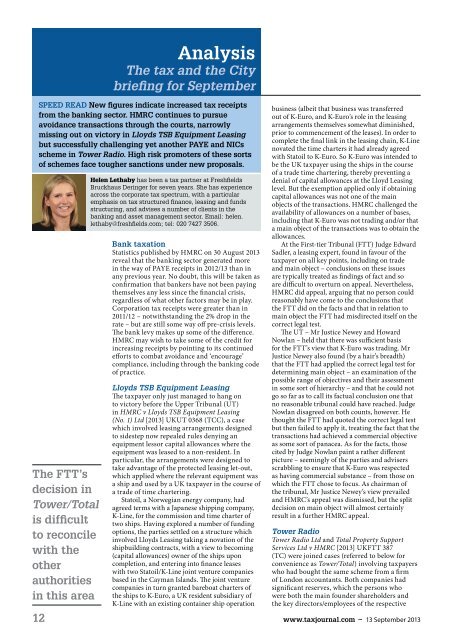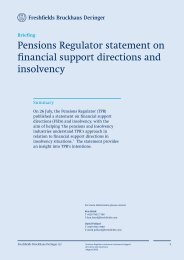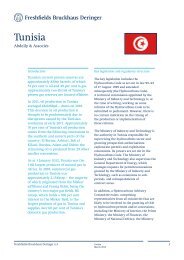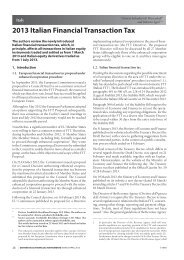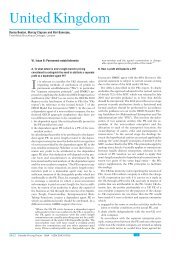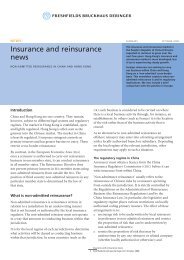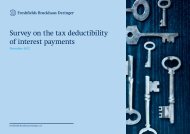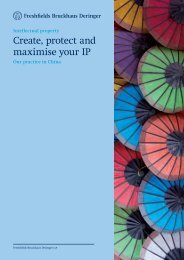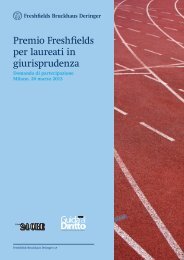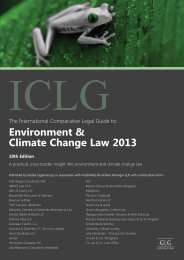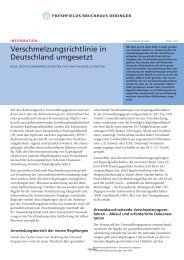Tax and the City - Freshfields
Tax and the City - Freshfields
Tax and the City - Freshfields
You also want an ePaper? Increase the reach of your titles
YUMPU automatically turns print PDFs into web optimized ePapers that Google loves.
AnalysisThe tax <strong>and</strong> <strong>the</strong> <strong>City</strong>briefing for SeptemberSPEED READ New figures indicate increased tax receiptsfrom <strong>the</strong> banking sector. HMRC continues to pursueavoidance transactions through <strong>the</strong> courts, narrowlymissing out on victory in Lloyds TSB Equipment Leasingbut successfully challenging yet ano<strong>the</strong>r PAYE <strong>and</strong> NICsscheme in Tower Radio. High risk promoters of <strong>the</strong>se sortsof schemes face tougher sanctions under new proposals.The FTT’sdecision inTower/Totalis difficultto reconcilewith <strong>the</strong>o<strong>the</strong>rauthoritiesin this area12Helen Lethaby has been a tax partner at <strong>Freshfields</strong>Bruckhaus Deringer for seven years. She has experienceacross <strong>the</strong> corporate tax spectrum, with a particularemphasis on tax structured finance, leasing <strong>and</strong> fundsstructuring, <strong>and</strong> advises a number of clients in <strong>the</strong>banking <strong>and</strong> asset management sector. Email: helen.lethaby@freshfields.com; tel: 020 7427 3506.Bank taxationStatistics published by HMRC on 30 August 2013reveal that <strong>the</strong> banking sector generated morein <strong>the</strong> way of PAYE receipts in 2012/13 than inany previous year. No doubt, this will be taken asconfirmation that bankers have not been paying<strong>the</strong>mselves any less since <strong>the</strong> financial crisis,regardless of what o<strong>the</strong>r factors may be in play.Corporation tax receipts were greater than in2011/12 – notwithst<strong>and</strong>ing <strong>the</strong> 2% drop in <strong>the</strong>rate – but are still some way off pre-crisis levels.The bank levy makes up some of <strong>the</strong> difference.HMRC may wish to take some of <strong>the</strong> credit forincreasing receipts by pointing to its continuedefforts to combat avoidance <strong>and</strong> ‘encourage’compliance, including through <strong>the</strong> banking codeof practice.Lloyds TSB Equipment LeasingThe taxpayer only just managed to hang onto victory before <strong>the</strong> Upper Tribunal (UT)in HMRC v Lloyds TSB Equipment Leasing(No. 1) Ltd [2013] UKUT 0368 (TCC), a casewhich involved leasing arrangements designedto sidestep now repealed rules denying anequipment lessor capital allowances where <strong>the</strong>equipment was leased to a non-resident. Inparticular, <strong>the</strong> arrangements were designed totake advantage of <strong>the</strong> protected leasing let-out,which applied where <strong>the</strong> relevant equipment wasa ship <strong>and</strong> used by a UK taxpayer in <strong>the</strong> course ofa trade of time chartering.Statoil, a Norwegian energy company, hadagreed terms with a Japanese shipping company,K-Line, for <strong>the</strong> commission <strong>and</strong> time charter oftwo ships. Having explored a number of fundingoptions, <strong>the</strong> parties settled on a structure whichinvolved Lloyds Leasing taking a novation of <strong>the</strong>shipbuilding contracts, with a view to becoming(capital allowances) owner of <strong>the</strong> ships uponcompletion, <strong>and</strong> entering into finance leaseswith two Statoil/K-Line joint venture companiesbased in <strong>the</strong> Cayman Isl<strong>and</strong>s. The joint venturecompanies in turn granted bareboat charters of<strong>the</strong> ships to K-Euro, a UK resident subsidiary ofK-Line with an existing container ship operationbusiness (albeit that business was transferredout of K-Euro, <strong>and</strong> K-Euro’s role in <strong>the</strong> leasingarrangements <strong>the</strong>mselves somewhat diminished,prior to commencement of <strong>the</strong> leases). In order tocomplete <strong>the</strong> final link in <strong>the</strong> leasing chain, K-Linenovated <strong>the</strong> time charters it had already agreedwith Statoil to K-Euro. So K-Euro was intended tobe <strong>the</strong> UK taxpayer using <strong>the</strong> ships in <strong>the</strong> courseof a trade time chartering, <strong>the</strong>reby preventing adenial of capital allowances at <strong>the</strong> Lloyd Leasinglevel. But <strong>the</strong> exemption applied only if obtainingcapital allowances was not one of <strong>the</strong> mainobjects of <strong>the</strong> transactions. HMRC challenged <strong>the</strong>availability of allowances on a number of bases,including that K-Euro was not trading <strong>and</strong>/or thata main object of <strong>the</strong> transactions was to obtain <strong>the</strong>allowances.At <strong>the</strong> First-tier Tribunal (FTT) Judge EdwardSadler, a leasing expert, found in favour of <strong>the</strong>taxpayer on all key points, including on trade<strong>and</strong> main object – conclusions on <strong>the</strong>se issuesare typically treated as findings of fact <strong>and</strong> soare difficult to overturn on appeal. Never<strong>the</strong>less,HMRC did appeal, arguing that no person couldreasonably have come to <strong>the</strong> conclusions that<strong>the</strong> FTT did on <strong>the</strong> facts <strong>and</strong> that in relation tomain object <strong>the</strong> FTT had misdirected itself on <strong>the</strong>correct legal test.The UT – Mr Justice Newey <strong>and</strong> HowardNowlan – held that <strong>the</strong>re was sufficient basisfor <strong>the</strong> FTT’s view that K-Euro was trading. MrJustice Newey also found (by a hair’s breadth)that <strong>the</strong> FTT had applied <strong>the</strong> correct legal test fordetermining main object – an examination of <strong>the</strong>possible range of objectives <strong>and</strong> <strong>the</strong>ir assessmentin some sort of hierarchy – <strong>and</strong> that he could notgo so far as to call its factual conclusion one thatno reasonable tribunal could have reached. JudgeNowlan disagreed on both counts, however. Hethought <strong>the</strong> FTT had quoted <strong>the</strong> correct legal testbut <strong>the</strong>n failed to apply it, treating <strong>the</strong> fact that <strong>the</strong>transactions had achieved a commercial objectiveas some sort of panacea. As for <strong>the</strong> facts, thosecited by Judge Nowlan paint a ra<strong>the</strong>r differentpicture – seemingly of <strong>the</strong> parties <strong>and</strong> advisersscrabbling to ensure that K-Euro was respectedas having commercial substance – from those onwhich <strong>the</strong> FTT chose to focus. As chairman of<strong>the</strong> tribunal, Mr Justice Newey’s view prevailed<strong>and</strong> HMRC’s appeal was dismissed, but <strong>the</strong> splitdecision on main object will almost certainlyresult in a fur<strong>the</strong>r HMRC appeal.Tower RadioTower Radio Ltd <strong>and</strong> Total Property SupportServices Ltd v HMRC [2013] UKFTT 387(TC) were joined cases (referred to below forconvenience as Tower/Total) involving taxpayerswho had bought <strong>the</strong> same scheme from a firmof London accountants. Both companies hadsignificant reserves, which <strong>the</strong> persons whowere both <strong>the</strong> main founder shareholders <strong>and</strong><strong>the</strong> key directors/employees of <strong>the</strong> respectivewww.taxjournal.com ~ 13 September 2013
companies wished to extract in as tax-efficientmanner as possible. It is worth pausing here, for<strong>the</strong> case largely proceeds on <strong>the</strong> basis that <strong>the</strong> taxavoidance at issue in <strong>the</strong> case was <strong>the</strong> avoidanceof employment income (including PAYE <strong>and</strong>NIC); however, given <strong>the</strong> ‘business owner’ statusof <strong>the</strong> protagonists <strong>and</strong> <strong>the</strong> fact that <strong>the</strong>y couldhave paid <strong>the</strong>mselves dividends, <strong>the</strong> case mightmore naturally be seen as one of avoidance ofincome tax on distributions. (Admittedly, inTower Radio at least, a dividend would haveaccrued to <strong>the</strong> benefit of certain family membershareholders as well, but presumably <strong>the</strong>y couldhave waived <strong>the</strong>ir dividend rights as easily as<strong>the</strong>y voted through <strong>the</strong> bonus proposal.)The planning was designed to secure CGTtreatment (CGT <strong>the</strong>n being chargeable at 18%,or 10% with business asset taper relief) for<strong>the</strong> extracted funds, as opposed to income taxtreatment (40% for employment income, plusemployee <strong>and</strong> employer NICs, or an effectivetax rate of 25% for dividends). It involved eachemployer company using its reserves to subscribefor two classes of shares in a new special purposecompany (SPC), <strong>and</strong> awarding <strong>the</strong> class carrying<strong>the</strong> majority of <strong>the</strong> economic rights to <strong>the</strong> keyindividual as a bonus, on terms that a cessationof office or employment o<strong>the</strong>rwise than by reasonof death would result in <strong>the</strong> individual beingrequired to sell <strong>the</strong> shares for 95% of <strong>the</strong>ir marketvalue. This restriction was intended to confer‘restricted securities’ status on <strong>the</strong> SPC shares,such that <strong>the</strong>ir award escaped an upfront incometax charge by virtue of ITEPA 2003 s 425. Theplan was <strong>the</strong>n that, sooner or later, <strong>the</strong> SPC wouldbe liquidated <strong>and</strong> its assets distributed to <strong>the</strong>individual pursuant to his shareholder rights. As aliquidation does not constitute a ‘chargeable event’for <strong>the</strong> purposes of <strong>the</strong> restricted securities code,no fur<strong>the</strong>r income tax charge would arise <strong>and</strong>instead <strong>the</strong> individual would be subject to CGT.The FTT heard <strong>the</strong> case shortly afterpublication of <strong>the</strong> UT’s decision in UBS AG <strong>and</strong>DB Group Services (UK) Ltd v HMRC [2013] STC68 (<strong>the</strong> UBS/DB case). These cases also involvedplanning designed to exploit <strong>the</strong> restrictedsecurities code (originally conceived of as a meansto prevent vesting <strong>and</strong> transfer restrictions fromdepressing a day one income tax charge). TheUT held in <strong>the</strong> UBS/DB case that <strong>the</strong> prescriptivenature of <strong>the</strong> code did not lend itself to a broadbrushRamsay approach <strong>and</strong> that <strong>the</strong> cases stoodor fell on <strong>the</strong>ir technical merits.The FTT in Tower/Total also had to take intoaccount <strong>the</strong> Court of Appeal’s decision in PAHoldings Ltd v HMRC [2012] STC 582, whichconsidered that <strong>the</strong> essential nature of certaindividends as employment income meant that <strong>the</strong>employment income rules took precedence overany o<strong>the</strong>r head of charge.Cutting a long <strong>and</strong> complex story short, <strong>the</strong>FTT considered that <strong>the</strong> Tower/Total facts weredifferent from those in UBS/DB, predominantly13 September 2013 ~ www.taxjournal.combecause <strong>the</strong> employee beneficiaries in Tower/Totalcontrolled <strong>the</strong> relevant companies, whereas <strong>the</strong>employees in UBS/DB, being employees of largeinternational banks, did not. Because <strong>the</strong> Tower/Total individuals could effectively control <strong>the</strong> flowof funds from start to finish, Ramsay did applyto recharacterise <strong>the</strong> liquidation proceeds as a defacto cash bonus, following <strong>the</strong> line of authoritiesincluding DTE Financial Services Ltd v Wilson[2001] STC 777. Interestingly, <strong>the</strong> FTT did notapply PA Holdings (or even more recently SloaneRobinson Investment Services Ltd v HMRC [2012]SFTD 1181) to hold that <strong>the</strong> entitlement to bonuseshad crystallised before <strong>the</strong> mechanics were put inmotion, but ra<strong>the</strong>r treated <strong>the</strong> arrangements as <strong>the</strong>mode of delivery on Ramsay grounds.The FTT’s decision in Tower/Total is difficultto reconcile with <strong>the</strong> o<strong>the</strong>r authorities in thisarea, but it was arguably operating on a falsepremise – that <strong>the</strong> case was about avoiding tax onemployment income. It would perhaps have madefor a more coherent decision had HMRC treated<strong>the</strong> scheme as one of dividend tax avoidance<strong>and</strong> challenged it under, say, <strong>the</strong> transaction insecurities rules.High risk promotersHMRC remains committed to tackling <strong>the</strong>‘dodgy’ tax advisers who resist informationrequests <strong>and</strong> fail to inform <strong>the</strong>ir clients of <strong>the</strong>risks of entering into tax avoidance schemes. Aconsultation document entitled Raising <strong>the</strong> stakeson tax avoidance, published on 12 August 2013(available via www.lexisurl.com/hx677), seeksviews on a number of new measures, including:<strong>the</strong> criteria for identifying ‘high riskpromoters’, including a mixture of objective<strong>and</strong> subjective criteria;graduated procedures for dealing with highrisk promoters, including informal enquiries,voluntary undertakings, designations <strong>and</strong>appeals;<strong>the</strong> sanctions to be attached to high riskpromoter status, including beefed-upinformation powers, naming <strong>and</strong> shaming(including m<strong>and</strong>atory self-naming as part of<strong>the</strong> marketing process), <strong>and</strong> obligations onintermediaries <strong>and</strong> users;a statutory override of any contractualobligations with respect to confidentiality<strong>and</strong>/or disclosure to HMRC; <strong>and</strong>fur<strong>the</strong>r penalties for non-compliance.HMRC is also investigating ways of tacklingrogue advisers accused of ‘misselling’ taxschemes, <strong>and</strong> is proposing penalties for taxpayerswho fail to amend <strong>the</strong>ir tax returns followingan HMRC win in a case on a mass-marketedscheme.The disclosure of tax avoidance schemesregime (DOTAS) generally remains under review,with HMRC seeking informal feedback on <strong>the</strong>effectiveness of <strong>the</strong> regime <strong>and</strong> HMRC’s newapproach to communications.HMRCremainscommittedto tackling<strong>the</strong> ‘dodgy’tax advisersFor relatedreading, visitwww.taxjournal.comNews: Corporationtax <strong>and</strong> PAYEstats published for2012/13 (5.9.13)Cases: HMRCv Lloyds TSBEquipment Leasing(Alan Dolton, 28.8.13)Tower Radio: PAYE<strong>and</strong> NIC mitigationschemes (PhilipFisher, 2.8.13)Raising <strong>the</strong> stakeson tax avoidance(Hea<strong>the</strong>r Self, RayMcCann, MichaelAvient & JonathanLevy, 30.8.13)13


